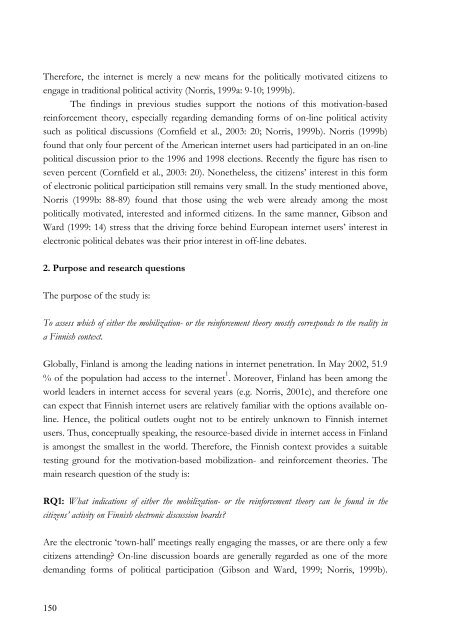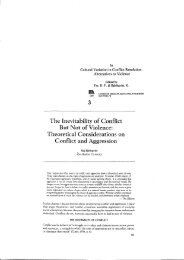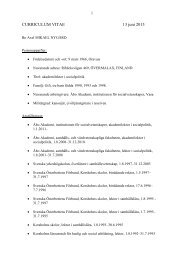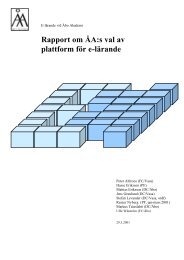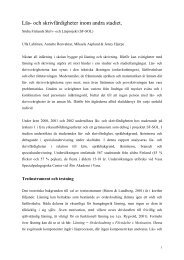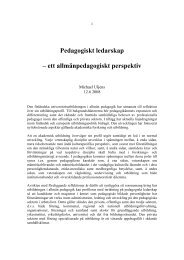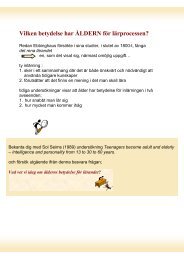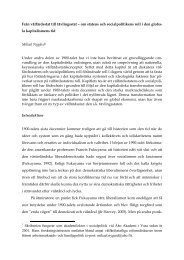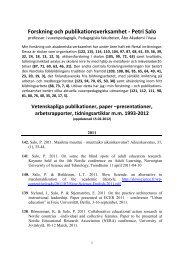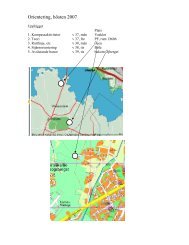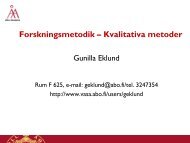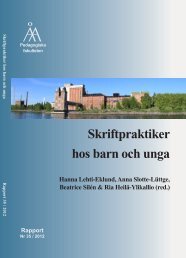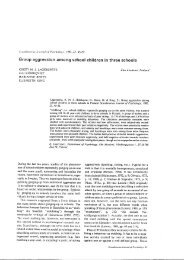Parties, Candidates and Citizens On-Line - Åbo Akademi
Parties, Candidates and Citizens On-Line - Åbo Akademi
Parties, Candidates and Citizens On-Line - Åbo Akademi
Create successful ePaper yourself
Turn your PDF publications into a flip-book with our unique Google optimized e-Paper software.
Therefore, the internet is merely a new means for the politically motivated citizens to<br />
engage in traditional political activity (Norris, 1999a: 9-10; 1999b).<br />
The findings in previous studies support the notions of this motivation-based<br />
reinforcement theory, especially regarding dem<strong>and</strong>ing forms of on-line political activity<br />
such as political discussions (Cornfield et al., 2003: 20; Norris, 1999b). Norris (1999b)<br />
found that only four percent of the American internet users had participated in an on-line<br />
political discussion prior to the 1996 <strong>and</strong> 1998 elections. Recently the figure has risen to<br />
seven percent (Cornfield et al., 2003: 20). Nonetheless, the citizens’ interest in this form<br />
of electronic political participation still remains very small. In the study mentioned above,<br />
Norris (1999b: 88-89) found that those using the web were already among the most<br />
politically motivated, interested <strong>and</strong> informed citizens. In the same manner, Gibson <strong>and</strong><br />
Ward (1999: 14) stress that the driving force behind European internet users’ interest in<br />
electronic political debates was their prior interest in off-line debates.<br />
2. Purpose <strong>and</strong> research questions<br />
The purpose of the study is:<br />
To assess which of either the mobilization- or the reinforcement theory mostly corresponds to the reality in<br />
a Finnish context.<br />
Globally, Finl<strong>and</strong> is among the leading nations in internet penetration. In May 2002, 51.9<br />
% of the population had access to the internet 1 . Moreover, Finl<strong>and</strong> has been among the<br />
world leaders in internet access for several years (e.g. Norris, 2001c), <strong>and</strong> therefore one<br />
can expect that Finnish internet users are relatively familiar with the options available online.<br />
Hence, the political outlets ought not to be entirely unknown to Finnish internet<br />
users. Thus, conceptually speaking, the resource-based divide in internet access in Finl<strong>and</strong><br />
is amongst the smallest in the world. Therefore, the Finnish context provides a suitable<br />
testing ground for the motivation-based mobilization- <strong>and</strong> reinforcement theories. The<br />
main research question of the study is:<br />
RQ1: What indications of either the mobilization- or the reinforcement theory can be found in the<br />
citizens’ activity on Finnish electronic discussion boards?<br />
Are the electronic ‘town-hall’ meetings really engaging the masses, or are there only a few<br />
citizens attending? <strong>On</strong>-line discussion boards are generally regarded as one of the more<br />
dem<strong>and</strong>ing forms of political participation (Gibson <strong>and</strong> Ward, 1999; Norris, 1999b).<br />
150


